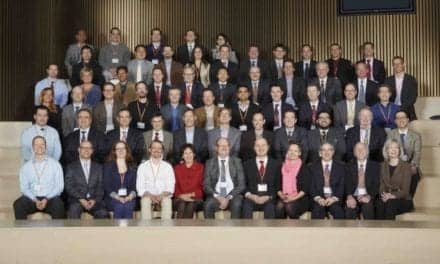 |
|
Brent Edwards, PhD |
The Starkey Hearing Research Center, a division of Starkey Laboratories Inc, Eden Prairie, Minn, in collaboration with the University of California at Berkeley, reports that the paper titled “Objective measures of listening effort: Effects of background noise and noise reduction” has received the Editors’ Award from the Journal of Speech, Language, and Hearing Research. The journal states that the article “meets the highest quality standards in research design, presentation, and impact.”
“We are truly honored to be chosen for this award,” said Brent Edwards, PhD, VP of research and director of the Starkey Hearing Research Center, Berkeley, Calif. “The impact of hearing loss on cognitive ability has been a strong research focus for our Research Center since we opened in 2004. This award is confirmation of the importance of this work to the hearing field.”
The paper, focusing on the impact of hearing aid technology on listening effort, included a collaborating team of researchers from the Starkey Hearing Research Center and the University of California at Berkeley including: Anastasios Sarampalis, PhD, and Professor Ervin Hafter, PhD, from the Department of Psychology, University of California at Berkeley; and Sridhar Kalluri, PhD, and Edwards, from the Starkey Hearing Research Center.
The research looked at the effect of noise reduction and directional microphones on speech understanding and listening effort. The study tested this hypothesis: the positive effects of noise reduction and directional microphones could help reduce the cognitive effort used to receive and understand speech, making additional cognitive resources available for other tasks. People with normal hearing participated in two dual-task experiments–one reporting sentences or words in noise at various signal-to-noise ratios (SNR), and the other either holding words in short-term memory or responding in a complex visual reaction-time task.
SNR improvements provided by hearing aid directional microphones resulted in better performance in speech understanding and in the secondary task, indicating that the SNR improvements reduce listening effort. Noise reduction had no positive effect on speech recognition and understanding, but it led to better performance on the memory and visual secondary tasks at low SNRs. The conclusion that can be drawn is that noise reduction and directional microphones reduced listening effort and freed up cognitive resources for other tasks.
“While no one has found compelling evidence that noise reduction (NR) in a hearing aid improves speech reception, the results here clearly show an effect on performance in a second task," said Professor Hafter. "This strongly suggests that dual-task methodology be applied in testing the efficacy of any algorithm designed for hearing and, perhaps, other devices used in auditory communication.”
The paper will receive the award officially at the American Speech-Language-Hearing Association (ASHA) Convention in November.
UC Berkeley is considered the world’s premier public university and a wellspring of innovation, claiming 21 Nobel Laureates, eight of whom are current faculty members. The campus is home to more than 130 academic departments and more than 80 interdisciplinary research units.
[Source: Starkey]




